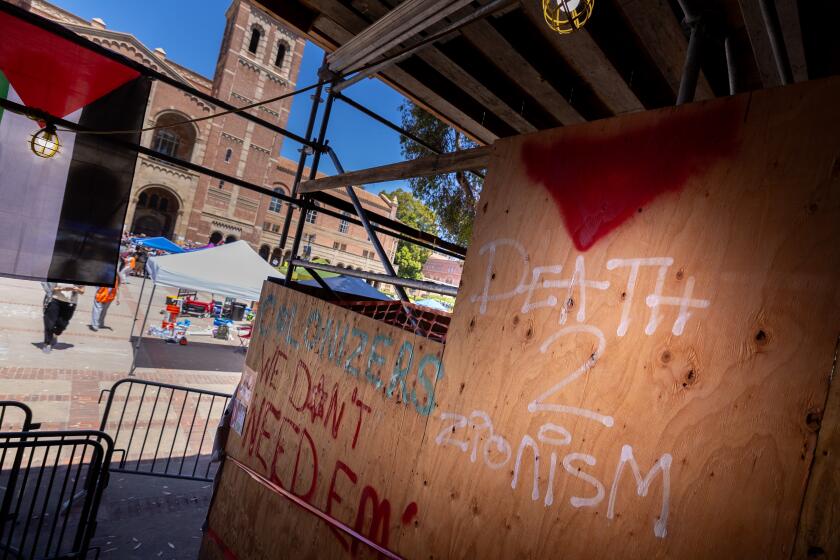He May Lack Votes, but Not Ambition
The bespectacled lawmaker marched into his plush office and settled before the television cameras. He grimaced shyly, almost whispering as he tested the microphones. And then, without a pause, Ayman Nour ripped into Egyptian President Hosni Mubarak’s ruling party.
The night before, one of Nour’s supporters had been killed and about a dozen more wounded when an armed mob ambushed their buses in the Nile Delta countryside, he said. According to Nour, ruling party officials paid thugs $10 each to block his party from opening a new office there.
“The one responsible for what happened yesterday is the head of the executive authority, and we name him: Mohammed Hosni Mubarak,” Nour says. “It’s not true that we have a ruler who’s willing to give up his throne. We have a ruler who’s willing to spill blood to keep it.”
Egyptian politics took an unpredictable turn when Mubarak promised to hold a presidential election this fall. For decades, Egyptians have gone dutifully to the polls to vote “yes” or “no” in presidential referendums in which Mubarak was the only choice.
Now the 40-year-old Nour has emerged as the most visible alternative to Mubarak. It’s a position he has earned in part by default. It was Mubarak’s security forces that boosted Nour’s popularity -- and introduced him to the world beyond Egypt -- when they recently jailed him on charges of faking signatures to form his party.
Nour’s arrest outraged his Egyptian allies, and their protest reached Washington. U.S. Secretary of State Condoleezza Rice canceled a visit to Egypt, reportedly to protest Nour’s imprisonment.
The Egyptian parliament will consider guidelines today spelling out who will -- and, more significantly, who will not -- be eligible to run for president. There is a chance that Nour will be excluded. But despite the many reasons Nour is unlikely to become president, he appears to have deeply annoyed the regime.
“So far he’s been outspoken, he was given a lot of space in the Western media, he was turned into ‘the main opposition leader in Egypt,’ ‘the only alternative to the ruling party,’ and so on,” says Mohammed Kamal, a member of the policy secretariat of the ruling National Democratic Party. “He’s entitled to say that about himself. The Western media is entitled to describe him in any way they want. But the real test is going to be the election, the votes.”
In the weeks before he was detained, Nour had been calling for a constitutional overhaul to curtail Mubarak’s powers or to oust him altogether.
The government accused Nour of faking signatures when he established his party, but the arrest raised immediate suspicions of political motivation.
“They thought they could give one strong blow on one day and finish Ayman Nour forever,” Nour said in a recent interview. “The end result was that the whole case became a public scandal for the government.”
After 42 days in prison, Nour was freed to await trial. Since his release, he has been smeared in government-linked newspapers and called a “rat” in banners draped throughout his district.
“I don’t think there are specific orders for people to go after him or harass him,” Kamal says. “But this is an election environment, and you expect a lot of things like that happening.”
Nour doesn’t seem like much of a challenge to a president who has maintained an unshaken grip on Egypt since taking power 24 years ago.
Nour has a fervent but small power base in a gritty Cairo neighborhood. His detractors dismiss him as a political nobody, “at bottom a TV phenomenon,” as the government-run Al Ahram newspaper wrote.
Nour is due to stand trial for forgery next month. Because of a summertime court recess, he could be tied up in court or behind bars on election day.
“I think the government will try very hard, will push to prevent Ayman Nour from becoming a candidate,” says Ahmed Seif Islam, director of Cairo’s Hisham Mubarak Law Center. “If the government succeeds in using legal techniques to block Ayman Nour, people will lose interest in the election.”
When Nour’s followers give directions to his weekly rallies in the Cairo neighborhood of Bab al Shaeriya, they usually quip that you’re getting close when you see the signs insulting Nour.
The banners are slung over a rough cluster of butcher shops, juice stands and coffeehouses: “Bab al Shaeriya renounces every outlaw, every deviant, every traitor to the country, every agent of colonialism,” says one.
“We are united behind President Mubarak,” says another.
“Those who lie and say Egypt doesn’t have democracy should come to Bab al Shaeriya.”
Asked about the signs, the shop owners roll their eyes and shrug.
“It’s the ruling party who put all of these up,” says Khaled Abdel Alim, who sells sinks and toilets. “All of a sudden they made a fuss about Ayman Nour.”
Nour represents the neighborhood in parliament and has spent years here building popularity the old-fashioned way: dropping money and doling out favors to the needy.
The son of a lawyer and a French teacher in the Nile Delta town of Mansoura, Nour studied law in Egypt and then worked for a few years as a muckraking journalist. He was elected to parliament 10 years ago as a 30-year-old member of the Wafd Party. He quickly earned a reputation as a young, loudmouthed liberal, a man who didn’t shy away from flamboyant flourishes to make his point. He published photographs that had been smuggled out of Egypt’s torture chambers. He showed up in parliament one day with a dirty, misshapen lump of bread to show ministers what many Egyptians were eating.
“He was always having trouble with the regime,” says Gamila Ismael, a journalist who is Nour’s wife and unofficial press secretary. “Life was such a painful adventure.”
Nour left the Wafd Party to help found the Tomorrow Party. Its members describe Tomorrow as a liberal, democratic opposition party that stands for reform and modernization.
From his headquarters in Bab al Shaeriya, Nour has begun to open party offices around the country, campaign door to door and erect billboards telling Egyptians they can buy their freedom for the price of his party’s newspaper. On Wednesday nights, in a rundown cultural center, he presides over political meetings packed with hundreds of rowdy supporters and ringed by thick lines of riot police.
Nour supporters who crowd the meetings have dirt under their fingernails and clothes that look as if they’ve been carefully mended over the years. Old men nod into their newspapers and lean on crutches; veiled women shuffle back and forth on an ashy graveyard of cigarette butts. They pack the hall despite their skepticism over elections. They are looking for a change, and they see a glimmer in Nour.
“It’s unacceptable that a political party has led this country with so much failure for 24 years,” says a 52-year-old worker named Noredin Anwar. “We’ve never had a clean election in the past, so why now?”
Outside, Nour’s black Mercedes pulls to the curb, and the lawmaker steps down. Old women grab at him; men plant kisses on his cheeks; parents hoist their children aloft to catch a glimpse of him as he makes his way under the naked fluorescent bulbs to the wooden stage.
“I’m asking anybody who loves the country to come here so we can talk,” he tells the crowd. “Egypt has begun to express its desire to change.”
The Nour camp reckons his arrest is the best thing that happened to his campaign. The detention ratcheted up international pressure on Mubarak and burnished Nour’s image among ordinary Egyptians, his supporters say.
“The attacks have been great for us. We got more support, and we got more members,” says Tabie Sayed Daoud, a Tomorrow member.
It started one weekend in late January: The government stripped Nour of the legal immunity granted to members of the Egyptian parliament.
State security officers arrested him as he was walking out of parliament, and they raided his house and office.
Nour says he was beaten with fists and sticks, kicked and handcuffed in a prison van where he bounced off the walls “like a pool ball.” For three days, he says, he was held underground in a cell the size of a grave.
“I felt my soul was getting out of my body and coming back because there was nowhere for it to go,” Nour says. “I told myself, if I die here, nobody will even know.
“My kids always knew I carried some kind of message, but they never knew how serious it was until I was arrested,” says Nour, a father of two teenage sons. “Now they go to the demonstrations.”
Anti-Mubarak street protests have been growing. A movement that calls itself “Enough” has dedicated itself to Mubarak’s ouster. Groups of judges and professors have lashed out against the regime. The government has pounded back with a harsh crackdown on dissent, rounding up members of the outlawed Islamist organization Muslim Brotherhood and choking off demonstrations.
Some analysts believe that in the rise of Nour, the ruling party discerns not an immediate threat, but the danger of a slow corrosion of power. Nour speaks of himself as a more desirable alternative to Gamal Mubarak, the president’s son and oft-rumored successor.
Nour says he offers Egyptians what Gamal Mubarak has failed to deliver -- an appeal to the young, professional class that has grown impatient with political stagnation in Egypt.
“We speak in a language the regime is not used to,” Nour says, settling into a brocaded armchair before a massive gilt fireplace in his living room. “They realized that we have a very ambitious project, and that it will cost them sooner or later.”
The Tomorrow Party is seeking to disprove one of Mubarak’s longtime excuses for holding power. The president has often argued that true democracy would destabilize Egypt and the rest of the region by sweeping the banned Muslim Brotherhood to power.
“We are not Islamists, but we have a mass following. This embarrasses them and exposes his argument,” Nour says. “Maybe we don’t have the same popularity as the Islamists, but if given a chance we can reach a new balance.”
Even if Nour manages to overcome the forgery charges and become a candidate, his chances are hard to predict. His national popularity is untested, and Egyptian elections have a long history of fraud. Maybe that’s why Nour isn’t talking like a man who would be president.
The election is tainted with “500,000 problems,” he says.
He says his ambitions are modest -- instead of ruling, he speaks of upsetting, shocking, undermining.
“If we could just manage to get Mubarak on a television debate with me, we could really do something,” he says. “We need to get a halfway fair election, and then we’ll have a stunning election.”
More to Read
Start your day right
Sign up for Essential California for news, features and recommendations from the L.A. Times and beyond in your inbox six days a week.
You may occasionally receive promotional content from the Los Angeles Times.






